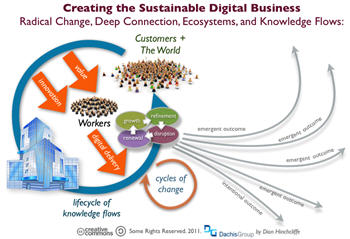In these often-trying economic times, a tide of sometimes overwhelming change in technology and its disruptive consequences has begun rolling over our organizations. We've all seen it in the media, in our homes, at our workplaces. It's not too much to say that the entire landscape of how we work and live is steadily being transformed, one piece at a time. The root causes are fairly obvious because they're happening all around us: the Internet revolution, the smart mobile revolution, the social media revolution, the rise of the cloud, the vast new flood of information in our daily lives and the fact that we're getting more and more comfortable with technology being deeply embedded in our day-to-day activities, even if we don't always realize it. The same transformation is happening to businesses, just more slowly and often with a bit more turbulence.

However, the current pace of change is not-unsustainable and we don't have to be — and shouldn't be — passive bystanders in the process. There's a lot all of us can do, and done smartly, locally and proactively we can actually harness change as major drivers of opportunity and business value. As I've recently explored in the Big Five shifts in technology today (mobile, social, cloud, consumerization and big data), we can actually get out ahead and modify the way we think about metabolizing technology in the enterprise and applying it to long-standing and new business challenges both. I've previously suggested 10 strategies that will help organizations restructure how they apply technology to their organizations strategically. But as activities alone they are not enough. We have to change our thinking in a way that lets us focus on what's most important as we became true digital businesses.
When it comes to businesses acquiring a digital DNA and moving out of the strictures that 20th century business thinking and operating models impose, I believe the concepts that are listed below are the core ones we need to internalize deeply within our organizations. The signature challenge: It will be intrinsically difficult, culturally and organizationally, for many to make the transition.
Most companies have an immune system that throws out ideas that are perceived as disruptive, until at last it's overcome by persistence, successful adaptation or exigency. Often the new concepts are just too foreign or there is too much vested interest in the way things are done now, and a dozen other headwinds. While creative destruction is the approach of last resort, and many organizations will be able to find their way forward without it, it must be an option on the table for organizations that want to survive for long term. The urgency is here: the mismatch between businesses today and the digital world is growing wider, not narrower, at the moment.
One need only look at a long list of organizations and industries unwilling to change quickly enough to see clear examples of what happens: the publishing industry, the music industry, the software industry and soon most other industries. One only need look at how digital businesses threatens the old business models of each to see the problem: there is often no direct lateral move to digital business. E-books, digital and streaming music, and open source/SaaS are not replacing the old business models with anything like the same revenue. They can't just pave over their existing business model with a digital road and declare success.
Businesses will have to be rethought from the ground up, including their value proposition. This is often a non-starter that's quite unpopular with shareholders, managers or workers in the short term. It is, however, highly likely to be very valuable and desired by customers and the marketplace. The long-term consequence of a failure to adapt to the pervasively networked and digital future is even less desirable however than change. It generally looks like a shrinking business over time and eventually evaporates. Organizations do certainly have to preserve what is sustaining them now, while they actively take proactive steps to transition to digital business. These I believe are the ideas that will help get them there:
1. Thinking in terms of ecosystems
Tomorrow's business environments will be much less structured around transactions and much more focused on the dynamism and value inherent in relationships. While both transactions and relationships will remain important to businesses, those with the strongest ties to their communities of workers, partners and customers will fare better than those with weaker ties. With the advent of social media, there are now lightweight and readily scaled ways to create networks of relatively closely held and productive business relationships. This will change how business gets done and who the leaders are.
2. Managing businesses as networks of people
People are moving back to the center of business, where technology and automation previously reigned. People will form the core, but so too will the new infrastructure that businesses operate in, which increasingly is all the elements of today's digital networks, including social media, new user experiences with mobile, touch, video and telepresence. For the first time, this infrastructure now also includes something known as social capital. This is the sum total of the formal and informal connections one has with people and organizations in the digital world and defines the reach and power of the modern business ecosystem.
3. Shifting from static to dynamic notions of value
This is the concept that John Hagel has been discussing over the years about "knowledge stocks," the relatively stable inventory of classical corporate information that companies have been accumulating over the years. These are now being superceded by more valuable and faster moving "knowledge flows." Knowledge flows are richer, more up-to-date, are harder to disrupt and less likely to become out-dated and irrelevant than knowledge stocks. Enterprises that are not fluid in terms of cultivating, tapping into and controlling strong knowledge flows will have little future when their knowledge stocks age and become less and less relevant.
4. Designing businesses for radical change
The inability to overcome failure of imagination and find their way forward in a major dislocation (such as the present digital one) is often the cause of death of many well established companies. As thinkers like Dave Gray have recently observed, the life span of the modern enterprise has grown dramatically shorter in the last couple of decades because companies can't adapt fast enough. Not-invented here, cultural obstacles and inherent challenges in self-disrupting before the marketplace does it — all weigh heavily on large organizations that are slow moving or not digitally savvy.
That said, a few leading organizations are clearly showing that they can change their colors, but it requires real commitment and investment from the top. I find that a limited number of enterprise leaders have the management support and/or the skill for making bold moves in today's trying economic climate. Instead, what we need to be doing is providing clear parameters and resources to our most innovative workers and setting them loose to experiment and pathfind the way forward. Distributing and scaling response to change is a key step in deliberately designing a business for a very different and unknown future.
5. Opening the culture of the organization
Companies that have stood the test of time are very good adapters. They listen to their market, watch it closely and match it move for move. They are also open to new ideas and willing to experiment. There are plenty of successful companies that don't have these traits, but they often come to unfortunately rapid "transition" (being acquired, going out of business, etc.). That said, I believe that the companies who have leaders that know how to lead through the network, as opposed to doing it in person or even over older technologies such as email and telephone, will be able to set the example, drive excellence in new digital business models and unleash the latent talent and information in their organization.
6. Tapping into collective intelligence
Making sense of the vast flows of knowledge in today's digital rivers using new business intelligence techniques and so-called "big data" tools will be a major differentiator. Knowing what your competitors don't and deeply understanding the marketplace in order to respond to change well is what companies are already starting to focus on these days.
Some of this might sound theoretical or high-level, but the challenge is that whatever you plan for today in terms adapting to specific technologies or trends will be ineffective by the time you get the response in place. That's the signature challenge of hyper-change. Instead, by moving up a level to changing the stance of the organization so that it naturally and constructively adapts on the ground to the changes around it, taking advantage of opportunities and repelling challenges is a much stronger, more systemic and effective way of managing a digital organization in the 21st century.
About the Author
Dion Hinchcliffe is a internationally recognized business strategist, enterprise architect, and keynote speaker. He is currently Executive Vice President of Strategy at Dachis Group. Dion focuses on the topics of Enterprise 2.0, Web 2.0, Social Business, Service-Oriented Architecture (SOA), open business models, and next-generation enterprises. His thought leadership can be found on ZDNet, ebizQ, Social Computing Journal, and Musings and Ruminations on Building Great Systems. He co-authored Web 2.0 Architectures for O'Reilly and operates Web 2.0 University. You can also reach Dion at [email protected]































